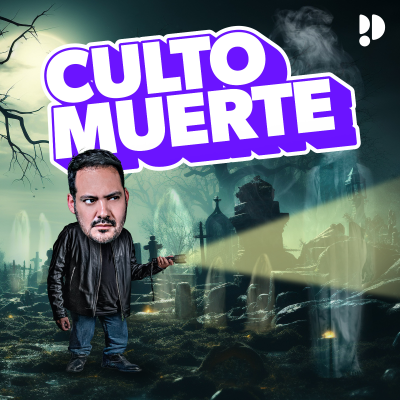
Radulich in Broadcasting
English
Culture & leisure
Limited Offer
2 months for 19 kr.
Then 99 kr. / monthCancel anytime.
- 20 hours of audiobooks / month
- Podcasts only on Podimo
- All free podcasts
About Radulich in Broadcasting
Radulich in Broadcasting has a great reputation for providing tremendous podcast content in the Entertainment world. Now, they bring their myriad of shows to the W2M Network. Prepare for great things from Movie and Metal Music Reviews to Comic Book talk and more. Mark Radulich has been an internet personality since 2004 with his Progressive Conservatism blog. He then took that blog to the airwaves and created a podcast for it. It then changed to PC Live. After that, he brought out the 411mania Ground and Pound Radio as well. Finally, Mark would partner up with another 411mania alum, Sean Comer, to create the movie franchise review podcast Long Road to Ruin and then Robert Cooper to create the metal album review podcast, The Metal Hammer of Doom. Robert Winfree took over the MMA show and then added his own podcast, Everybody Loves a Bad Guy. That’s when the Radulich in Broadcasting Network was born. Joining Winfree in having their own podcasts were super fan’s Jesse Starcher (Source Material) and Jayson Teasley (From the Cheap Seats). The RIB has also partnered with The Casual Heroes for wrestling shows and the occasional movie related podcast. Finally Winfree and Radulich added a weekly movie review show to the ever growing lists of podcasts on the Network.Don't forget to give that Radulich in Broadcasting Network Facebook page a like to stay up on top of all the great podcasts that they have to offer. You can find them at your convenience on blogtalkradio.com, Stitcher, TuneIn Radio, or iTunes! Just search "radulich" to subscribe to the network
All episodes
6050 episodesTriple Feature: Oh. What. Fun./Jingle Bell Heist/A Merry Little Ex-Mas
This episode features a streaming-era Christmas triple feature examining how modern holiday films handle conflict, resentment, and emotional labor: Oh. What. Fun., A Merry Little Ex-Mas, and Jingle Bell Heist. Oh. What. Fun. was released by Prime Video in 2024 as a holiday comedy aimed at adult audiences, with a cast led by established, middle-aged performers and a narrative centered on maternal burnout and invisible labor. Critical reception was mixed to negative, with reviewers divided on tone, though some praised its willingness to depict flawed, resentful characters. A Merry Little Ex-Mas, a 2024 Netflix original rom-com, targets millennial and Gen Z viewers fluent in therapy culture, featuring a recognizable streaming-friendly cast and a Christmas setting built around emotional reconciliation. Critics largely noted its heavy reliance on therapy-speak and safe conflict resolution, resulting in lukewarm aggregate scores. Jingle Bell Heist, also released by Netflix in 2024, leans into the holiday caper genre, combining romance with a Christmas Eve robbery plot and a younger, internationally marketable cast. Reviews were mixed but slightly more favorable than typical seasonal filler, and the film performed well in Netflix’s global streaming charts despite modest critic scores. Together, these films offer a snapshot of how streaming platforms shape modern holiday storytelling. Disclaimer: The following may contain offensive language, adult humor, and/or content that some viewers may find offensive – The views and opinions expressed by any one speaker does not explicitly or necessarily reflect or represent those of Mark Radulich or W2M Network. Mark Radulich and his wacky podcast on all the things: https://linktr.ee/markkind76 also https://www.teepublic.com/user/radulich-in-broadcasting-network FB Messenger: Mark Radulich LCSW Tiktok: @markradulich twitter: @MarkRadulich Instagram: markkind76 RIBN Album Playlist: https://suno.com/playlist/91d704c9-d1ea-45a0-9ffe-5069497bad59
On Trial: Scrooged
Scrooged (1988) is an American Christmas fantasy black comedy directed by Richard Donner and written by Mitch Glazer and Michael O’Donoghue. Inspired by Charles Dickens’ A Christmas Carol, it offers a metafictional modern retelling starring Bill Murray as Frank Cross, a cynical TV executive preparing a live broadcast of A Christmas Carol who is visited by ghosts on Christmas Eve. The supporting cast includes Karen Allen, John Forsythe, Bobcat Goldthwait, Carol Kane, Robert Mitchum, Michael J. Pollard, and Alfre Woodard. Produced on a $32 million budget and filmed in New York City and Hollywood from December 1987 to March 1988, the film marked Murray’s return after a four-year hiatus following Ghostbusters. Production was turbulent due to creative clashes between Murray and Donner, though the film featured numerous celebrity cameos, including Murray’s brothers. Marketed heavily around Murray’s ghost-themed persona, Scrooged was released November 23, 1988, grossed over $100 million worldwide, and earned an Oscar nomination for Best Makeup. Though critics were mixed, it has since become a Christmastime staple and is often cited as an unconventional or ahead-of-its-time holiday classic. Disclaimer: The following may contain offensive language, adult humor, and/or content that some viewers may find offensive – The views and opinions expressed by any one speaker does not explicitly or necessarily reflect or represent those of Mark Radulich or W2M Network. Mark Radulich and his wacky podcast on all the things: https://linktr.ee/markkind76 also https://www.teepublic.com/user/radulich-in-broadcasting-network FB Messenger: Mark Radulich LCSW Tiktok: @markradulich twitter: @MarkRadulich Instagram: markkind76 RIBN Album Playlist: https://suno.com/playlist/91d704c9-d1ea-45a0-9ffe-5069497bad59
Damn You Hollywood: Frankenstein (2025)
Frankenstein is a 2025 American Gothic science fiction film produced, written, and directed by Guillermo del Toro, based on the 1818 novel by Mary Shelley. The film stars Oscar Isaac as Victor Frankenstein and Jacob Elordi as the Creature, with Mia Goth and Christoph Waltz in supporting roles. The story follows the life of Frankenstein, an egotistical scientist whose experiment in creating new life results in dangerous consequences. Del Toro had long imagined a faithful Frankenstein film as a "dream project". This was initially in development for Universal Pictures, with del Toro casting frequent collaborator Doug Jones as the Creature, and Bernie Wrightson being considered for the monster's design. However, Universal suspended the project in relation to its planned Dark Universe franchise. Netflix revived the project in 2023, with Elordi instead portraying the Creature. Filming took place from February to September 2024. Wrightson had died in 2017, and the illustrated compilation Bernie Wrightson's Frankenstein was a key inspiration for the film's look. Frankenstein premiered at the 82nd Venice International Film Festival on August 30, 2025. It had a limited theatrical release in the United States from October 17 and was globally released on November 7 on Netflix. The film received generally positive reviews from critics. Both the National Board of Review and the American Film Institute named it as one of the top ten films of 2025. It received five nominations at the 83rd Golden Globe Awards, including Best Motion Picture – Drama. Disclaimer: The following may contain offensive language, adult humor, and/or content that some viewers may find offensive – The views and opinions expressed by any one speaker does not explicitly or necessarily reflect or represent those of Mark Radulich or W2M Network. Mark Radulich and his wacky podcast on all the things: https://linktr.ee/markkind76 also https://www.teepublic.com/user/radulich-in-broadcasting-network FB Messenger: Mark Radulich LCSW Tiktok: @markradulich twitter: @MarkRadulich Instagram: markkind76 RIBN Album Playlist: https://suno.com/playlist/91d704c9-d1ea-45a0-9ffe-5069497bad59
Metal Hammer of Doom: Trans-Siberian Orchestra - The Ghosts of Christmas Eve
The Ghosts of Christmas Eve is a 1999 made-for-television film showcasing a Christmas music performance by Trans-Siberian Orchestra, starring Ossie Davis and Allie Sheridan. Guest performers included Michael Crawford and Jewel. Other performers include Bob Kinkel, Al Pitrelli, Chris Caffery, Johnny Lee Middleton, Jeff Plate, Tony Gaynor, Daryl Pediford and Tommy Farese. The film premiered on Fox Family Channel on December 14, 1999. Disclaimer: The following may contain offensive language, adult humor, and/or content that some viewers may find offensive – The views and opinions expressed by any one speaker does not explicitly or necessarily reflect or represent those of Mark Radulich or W2M Network. Mark Radulich and his wacky podcast on all the things: https://linktr.ee/markkind76 also https://www.teepublic.com/user/radulich-in-broadcasting-network FB Messenger: Mark Radulich LCSW Tiktok: @markradulich twitter: @MarkRadulich Instagram: markkind76 RIBN Album Playlist: https://suno.com/playlist/91d704c9-d1ea-45a0-9ffe-5069497bad59
Triple Feature: Christmas Chaos/Tromeo and Juliet/Frankenhooker
Tonight’s triple feature embraces the exact kind of weird that makes cinema fun. We open with Christmas Chaos! — a meta-documentary about the fictional StabaClaus franchise, built from chaotic behind-the-scenes lore and cast interviews. We’re doing it at Kathleen Benton’s request since she appears in the film, and if someone you know is in a piece of indie Christmas madness, you screen it. From there, we dive straight into Troma: Tromeo and Juliet and Frankenhooker. These aren’t just cult films — they’re punk cinema at full blast. Gleeful, grotesque, DIY to the bone, and totally uninterested in prestige respectability. Together, the three films form an accidental masterclass in joyful trash: fake slasher mythology, Shakespeare rewritten by lunatics, and a man who builds the perfect woman out of spare parts. A perfect Troma Christmas. Disclaimer: The following may contain offensive language, adult humor, and/or content that some viewers may find offensive – The views and opinions expressed by any one speaker does not explicitly or necessarily reflect or represent those of Mark Radulich or W2M Network. Mark Radulich and his wacky podcast on all the things: https://linktr.ee/markkind76 also https://www.teepublic.com/user/radulich-in-broadcasting-network FB Messenger: Mark Radulich LCSW Tiktok: @markradulich twitter: @MarkRadulich Instagram: markkind76 RIBN Album Playlist: https://suno.com/playlist/91d704c9-d1ea-45a0-9ffe-5069497bad59
Choose your subscription
Limited Offer
Premium
20 hours of audiobooks
Podcasts only on Podimo
All free podcasts
Cancel anytime
2 months for 19 kr.
Then 99 kr. / month
Premium Plus
Unlimited audiobooks
Podcasts only on Podimo
All free podcasts
Cancel anytime
Start 7 days free trial
Then 129 kr. / month
2 months for 19 kr. Then 99 kr. / month. Cancel anytime.





































